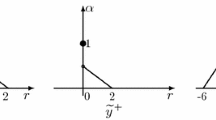Abstract
The concept of fuzzy scalar (inner) product that will be used in the fuzzy objective and inequality constraints of the fuzzy primal and dual linear programming problems with fuzzy coefficients is proposed in this paper. We also introduce a solution concept that is essentially similar to the notion of Pareto optimal solution in the multiobjective programming problems by imposing a partial ordering on the set of all fuzzy numbers. We then prove the weak and strong duality theorems for fuzzy linear programming problems with fuzzy coefficients.
Similar content being viewed by others
References
Bellman, R. E. and L. A. Zadeh. (1970). “Decision Making in a Fuzzy Environment,” Management Science 17, 141–164.
Delgado, M., J. Kacprzyk, J.-L. Verdegay, and M. A. Vila (eds). (1994). Fuzzy Optimization: Recent Advances. New York: Physica-Verlag.
Kall, P. (1976). Stochastic Linear Programming. New York: Springer-Verlag.
Klir, G. J. and B. Yuan. (1995). Fuzzy Sets and Fuzzy Logic: Theory and Applications. New Jersey: Prentice-Hall.
Lai, Y.-J. and C.-L. Hwang. (1992). Fuzzy Mathematical Programming: Methods and Applications, Lecture Notes in Economics and Mathematical Systems 394. New York: Springer-Verlag.
Lai, Y.-J. and C.-L. Hwang. (1994). Fuzzy Multiple Objective Decision Making: Methods and Applications, Lecture Notes in Economics and Mathematical Systems 404. New York: Springer-Verlag.
Liu, Y., Y. Shi, and Y.-H. Liu. (1995). “Duality of Fuzzy MC2 Linear Programming: A Constructive Approach,” J. Math. Anal. Appl. 194, 389–413.
Prékopa, A. (1995). Stochastic Programming. Boston: Kluwer Academic Publishers.
Richardt, J., F. Karl, and C. Mü ller. (1998). “Connections between Fuzzy Theory, Simulated Annealing, and Convex Duality,” Fuzzy Sets and Systems 96, 307–334.
Rodder, W. and H.-J. Zimmermann. (1977). “Duality in Fuzzy Linear Programming,” In Internat. Symp. on Extremal Methods and Systems Analysis. University of Texas at Austin, pp. 415–427.
Royden, H. L. (1968). Real Analysis (2nd). New York: Macmillan.
Rudin, W. (1986). Real and Complex Analysis (3rd). New York: McGraw-Hill Inc.
Sakawa, M. and H. Yano. (1994). “A Fuzzy Dual Decomposition Method for Large-Scale Multiobjective Nonlinear Programming Problems,” Fuzzy Sets and Systems 67, 19–27.
Slowinski, R. (ed.) (1998). Fuzzy Sets in Decision Analysis, Operations Research and Statistics. Boston: Kluwer Academic Publishers.
Stancu-Minasian, I. M. (1984). Stochastic Programming with Multiple Objective Functions. Bucharest, Romania: D. Reidel Publishing Company.
Vajda, S. (1972). Probabilistic Programming. New York: Academic Press.
Verdegay, J. L. (1984). “A Dual Approach to Solve the Fuzzy Linear Programming Problems,” Fuzzy Sets and Systems 14, 131–141.
Zadeh, L. A. (1965). “Fuzzy Sets,” Information and Control 8, 338–353.
Zadeh, L. A. (1975). “The Concept of Linguistic Variable and Its Application to Approximate Reasoning I, II, and III,” Information Sciences 8, 199–249; 8, 301–357; 9, 43–80.
Author information
Authors and Affiliations
Rights and permissions
About this article
Cite this article
Wu, HC. Duality Theory in Fuzzy Linear Programming Problems with Fuzzy Coefficients. Fuzzy Optimization and Decision Making 2, 61–73 (2003). https://doi.org/10.1023/A:1022852314914
Issue Date:
DOI: https://doi.org/10.1023/A:1022852314914




